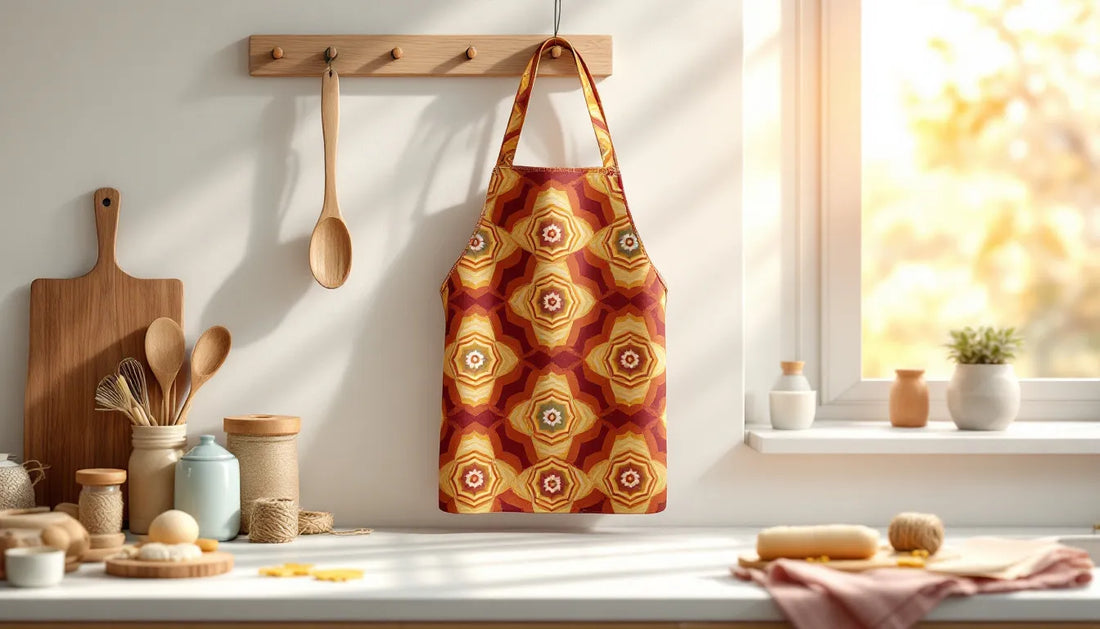
Adjustable Apron Features: Top 10 FAQs
Share
Adjustable aprons fit everyone, protect clothes, and boost cooking confidence. Here's what you need to know:
- Fit a wide range of body types
- Key features: adjustable neck strap, tough fabric, multiple pockets
- Machine washable for easy care
- Ideal for pro chefs and home cooks alike
Top 10 FAQs about adjustable aprons:
- How do straps work?
- What sizes do they fit?
- Which adjustment points matter?
- Do they fit all body types?
- How long do adjustable parts last?
- Can multiple people use one apron?
- Best materials for straps?
- How to set the right fit?
- Basic care tips?
- Who needs these most?
Quick Comparison:
| Feature | Benefit |
|---|---|
| Adjustable neck strap | Customize bib height |
| Tough fabric | Durable and easy to clean |
| Multiple pockets | Keep tools handy |
| Flexible fit | Works for different body types |
| Machine washable | Simple maintenance |
Adjustable aprons are versatile, durable, and practical for anyone who spends time in the kitchen or workshop.
Related video from YouTube
10 Common Questions About Adjustable Aprons
Let's tackle the top questions people ask about adjustable aprons.
1. How Do the Straps Work?
Adjustable aprons have straps at the neck and waist. The neck strap slides through casings near the armholes, letting you adjust the bib height. Waist straps tie in front or back for a custom fit.
2. What Sizes Do They Fit?
These aprons fit a wide range of body types. Here's a quick guide:
| Size | Best For |
|---|---|
| Small | Petite individuals or those wanting a snug fit |
| Medium | Most people - fits a wide range of body types |
| Large | People over 6' tall or weighing over 200 lbs |
For example, Ryan (6', 170 lbs) and Jill (5'5", 130 lbs) both wear a medium comfortably.
3. Which Adjustment Points Matter?
The key points are:
- Neck strap: Controls bib height
- Waist ties: Determines how snug the apron fits
- Back straps (if present): Allows extra fit customization
4. Do They Fit All Body Types?
Yes, they do. The Chef's Bib (40" L x 39" W) offers extra coverage for larger folks. The Petite Bib (29" L x 29" W) suits smaller frames.
5. How Long Do Adjustable Parts Last?
It depends on the material quality and how often you use it. Aprons made with tough materials like Kokka Canvas Ticking tend to have longer-lasting straps.
6. Can Multiple People Use One Apron?
You bet! These aprons are great for sharing. A 6-foot tall person and a 5'4" individual can use the same apron by adjusting the straps.
7. Best Materials for Straps
Look for:
- Cotton webbing: Comfy and easy to adjust
- Nylon: Strong and wear-resistant
- Leather: Tough and looks premium
8. How to Set the Right Fit
Here's how:
- Adjust the neck strap to set the bib height
- Wrap the waist ties around you
- Tie at your back or front
- Make sure you can move freely
9. Basic Care Tips
To keep your apron in good shape:
- Machine wash in cold water
- Skip the bleach
- Air dry or tumble dry on low
- Iron on medium if needed, but avoid the straps
10. Who Needs These Most?
Adjustable aprons are great for:
- Pro chefs needing full coverage
- Home cooks of different heights
- Crafters needing various protection levels
- Shared kitchens with multiple users
"Adjustable aprons are must-haves in pro and home kitchens. They fit different body types and provide great coverage", says a product expert at Cosmic Aprons.
sbb-itb-c693c43
Keeping Your Apron in Good Shape
Want your adjustable apron to last? Here's how to take care of it.
Washing Instructions
Washing your apron the right way keeps it clean and functional. Here's what to do:
1. Tackle stains first
Spot any stains? Hit them with stain remover or a baking soda-vinegar mix before washing.
2. Prep for the wash
Tie those apron strings into a bow and pop the whole thing in a mesh bag. Kelsey Youngman from Bon Appétit says this trick works wonders: "No more tangled mess from the dryer. Just a clean apron with tidy straps."
3. Pick the right cycle
Go gentle. Use warm water for cotton, cold for synthetics. Cold's usually best to stop stains from setting.
4. Choose your soap wisely
Mild, eco-friendly detergents are your friend. Got a white apron? Bleach might work. For colors, stick to color-safe options.
5. Drying do's and don'ts
Air drying's best. If you must use a dryer, keep the heat low.
Here's a quick guide for different materials:
| Material | Washing | Drying | Extra Care |
|---|---|---|---|
| Cotton Denim | Cold, separate | Air or low heat | Iron if needed |
| 100% Cotton | Cold, separate brights | Air or low heat | Iron if needed |
| Poly/Cotton | Cold | Air or low heat | Iron if needed |
| Linen | Hand wash, cold rinse | Air dry | Hot iron |
| PVC/Nylon | Wipe with soapy water | Air dry | No machine wash |
How to Store
Storing your apron right is just as crucial as washing it. Here's how:
Make sure it's bone-dry before putting it away. This stops mold and funky smells.
Keep it cool and out of the sun to avoid fading.
Hanging beats folding to dodge wrinkles. Try hooks or an apron rack for easy grab-and-go.
Don't cram it in with other stuff. This can wreck the fabric over time.
Give it a once-over now and then. Fixing small holes early keeps them from getting bigger.
Wrap-Up
Let's recap why adjustable aprons are a kitchen must-have:
Adjustable aprons fit everyone. Whether you're tall, short, or in-between, these aprons have got you covered. They're perfect for kitchens where multiple people cook.
The fabric you choose matters. Here's a quick rundown:
| Material | Good for | Best use |
|---|---|---|
| Cotton | Light, breathable, easy-clean | Baking, light cooking |
| Polyester | Tough, fights stains, no wrinkles | Heavy cooking, frequent use |
| Denim | Strong, stylish, gets better with age | Pro kitchens, BBQs |
| Linen | Classy, absorbent, softens over time | Fancy restaurants, home parties |
Pay attention to the straps. The neck, waist, and back straps (if there are any) are key for a comfy fit.
Take care of your apron, and it'll last longer. Most can go in the washing machine, but always check the label. Hanging to dry is often best.
Aprons aren't just for cooking. They're great for crafts, gardening, and other messy jobs around the house.
More aprons are going green. If you care about the environment, look for aprons made from organic cotton, recycled fabrics, or sustainable materials like hemp.
"Adjustable aprons are the perfect mix of comfort, toughness, and usefulness. They're great for anyone who spends a lot of time in the kitchen", says a product expert at Cosmic Aprons.
Wearing a well-fitted apron can boost your confidence and make cooking more fun.
Good aprons aren't cheap, but they're worth it. Spending $30 to $50 on a quality apron can save you money in the long run by protecting your clothes and lasting for years.
FAQs
How to make an apron tighter?
Want to make your apron fit like a glove? Here's how:
- Grab a tie in each hand
- Wrap them behind your back
- Keep the ties straight (no twists!)
- Pull them snug
- Tie a knot or bow
Here's a pro move: Pull those ties tight BEFORE you start tying. This trick gives you a snug, comfy fit.
This method works for all sorts of aprons:
| Apron Size | Who It's For | Tightening Trick |
|---|---|---|
| Regular | Women 10-18, Men S-L | Try cross-back style |
| Extra | Pregnant folks, larger sizes | Tweak the neck strap |
Both sizes come with adjustable straps, so you can make them fit just right.
"A well-fitted apron isn't just about looks. It's about comfort during those long cooking sessions", says a Cosmic Aprons expert.
Remember: A good fit means better protection, whether you're whipping up a storm in the kitchen or getting crafty.
